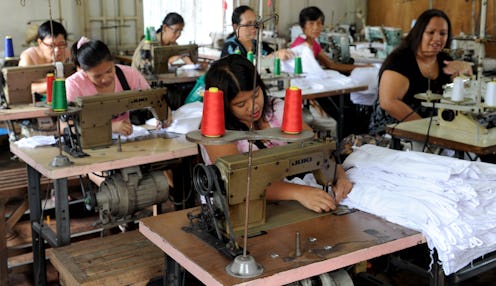In order to raise awareness about the exploitation of garment workers, The Canadian Fair Trade Network has released a campaign that features stories of sweatshop workers printed on clothing labels. These pictures will definitely make you think twice about buying fast fashion duds.
The sad reality the garment industry is that many companies unfairly compensate the people who make their clothing, many of whom are in developing nations. The War on Want reports that the majority of garment workers in Bangladesh make around $37 a month. They estimate that a living wage in Bangladesh is around $67 a month. Not to mention, many companies have been found using child labor. Workers are expected to work staggering hours and function in monstrously unsafe conditions. For instance, the War on Want reports that the workers in Bangladeshi sweat shops are expected to work 14-16 hour days, seven days a week. 85% of these workers are women.
To emphasize the tangible humanitarian consequences of buying mass-produced clothing, this Canadian organization teamed up with advertising agency Rethink and delved into what the people who make the clothing deal with every day. Each photograph shows a hanging garment with a lengthy care label imagining the workaday lives of people in nations like Cambodia, Sierra Leone, and Bangladesh who could have made the piece.
The above hoodie tells the story of Tejan, a man from Sierra Leone who scrapes together his paltry earnings from a cotton plantation to support two children. "The first few times he coughed up blood he hid it from his family," reads the label.
The tag of a cable-knit sweater recounts the tale of a nine-year-old Cambodian boy named Behnly, who works from sun-up to sun-down in a sweltering apparel warehouse.
Joya, a twelve-year-old Bangladeshi girl, works to support her mother and two siblings after her father died when the cotton factory where he worked burned down.
It's shamefully easy to ignore the reality of how your clothing was made when you buy it. The malls of America, the palaces of consumerism, seem far removed from the garment factories in the developing world. This campaign doesn't allow you to get away with ignoring the inconvenient truths of rampant consumerism. It confronts you with them at the exact right time— in the seemingly innocuous and harmless environment of the dressing room. Next time you're at some fast fashion emporium, imagine one of these tags on that $12 skirt. Although it seems like a deal in the moment, the cost is far greater.
